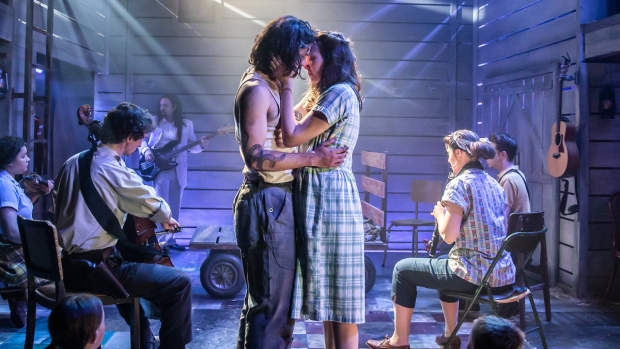”Whistle Down the Wind” at the Watermill – review

© Pamela Raith
Mention this evocative title to anyone of a certain age and they will probably remember Mary Hayley Bell’s poignant 1959 children’s novel. It tells the story of three children living the Lancastrian countryside who are convinced the escaped murderer they find hiding in a barn is Jesus Christ. By 1961, the beautiful film of the same name starring Bell’s daughter Hayley Mills had a real impact and widened awareness of the story. Andrew Lloyd Webber built on this profile with this imaginatively conceived musical, for which he wrote the book with Patricia Knop and Gale Edwards, with lyrics by Jim Steinman.
The musical premiered in 1996 in Washington DC, where it would resonate with American audiences, because Lloyd Webber and his creative team relocated the action in the States. It is set in Louisiana, the heart of the Bible Belt, an inspired move, for the starry-eyed youngsters at the heart of the story seem to belong naturally to this world of unquestioning belief.
The powerful story and rich musical score have ensured several UK revivals since it premiered here in 1998 and the title track and other numbers have been hits for artistes including Tina Arena, Elaine Page, Donny Osmond, Bonnie Tyler, Boy George, Meat Loaf and more, including Boyzone’s platinum single “No Matter What”.
The cast of Tom Jackson Greaves’ new production for the Watermill are more than a match for these big names. There is something magical about the way every show produced there fits so perfectly into this tiny intimate space, which here on designer Simon Kenny’s simple wooden boarded set morphs from church to barn to railway track as required, thanks to Andrew Exeter’s subtle lighting.
From the get-go, as the audience finds itself part of the congregation of Elliot Mackenzie’s mesmeric minister, it’s easy to see how the townsfolk are caught up in the power of song and rhetoric. The company’s actor-musicians wonderfully rise to the challenge of going into entirely credible rapture while keeping a tight hold on the reality of playing their instruments as well as their roles! Thus, Mackenzie is appropriately onstage MD, with piano, electric bass, drums, guitars and percussion at his fingertips. Most of the cast play a range of these instruments, with Emma Jane Morton’s Darleen adding a whole wind section (plus hot sax) and Charlotte Grayson’s Bertha a plangent violin and atmospheric melodica. Alfie Richard’s Earl, as an even more outlandish preacher who advocates revivalist meetings in his tent, is also hot and strong on strings and keys. The overall musical direction is down to George Francis and musical arrangements to Stuart Morley.
The story homes in on a little family struggling with their grief at the death of a much-loved wife and mother. The children are still haunted by her palpable presence, conjured by Stephanie Elstob, who is also assistant choreographer and dance captain. Boone, their father, is also struggling with single parenthood. For the children, everything reminds them of their mother and the fragility of life. So when they meet Ed and realise the bag he throws into the stream is filled with kittens, unsurprisingly they make it their mission to save them.
It only takes the stern warning of the town’s uncompromising Sheriff that an escaped murderer is on the loose to complete the set up. When the scene shifts to the barn at the family smallholding, and the wild-eyed man with his long, tangled hair and shabby clothes whom they find sleeping there awakes with a terrified cry of ‘Jesus Christ’, it’s hardly surprising that they are convinced he is indeed the risen Messiah. How he manipulates them and yet manages to retain a measure of audience sympathy is down both to the writing and to the subtly sympathetic performance of Aussie actor Robert Tripolino. “The Man” can hardly believe his good fortune and exploits it to the max to get the kids to both hide and help him, yet the way he engages with them and makes up a fun story in song is disarming.
The dark undertones in the story extend, as you would expect, to an ugly racism, experienced by the Black townsfolk. It’s hard for Chrissie Bhima’s feisty Candy and Lewis Cornay, as her empathetic white friend Amos, to connect in this place; and Jerome Lincoln’s resilient Ed works hard to make his own luck, singing in the bar.
The daughter who carries the story is teenage Swallow, played and sung with extraordinary tenderness by Lydia White. Her need for love and consolation, her readiness to believe in her Jesus Christ, whatever he asks of her, are entirely believable and actually heart-breaking.
She is ably and delightfully and supported by her younger siblings and their friends, played to touching and often sweetly comical perfection at the performance I saw, by Isabelle Carroll as Brat, Huey Lockwood as Poor Baby and Mieke Brown as Elizabeth; aided and abetted by their friends, Hugo Parker-Farrell as Winston, Imogen Jeremy as Ramona and Katie McGall as Louise.
It all amounts to an extraordinarily detailed and entirely enthralling account of a musical that richly deserves this revival. The audience were rapt in their attention – and the applause brought the cast back on stage for curtain call after curtain call.












